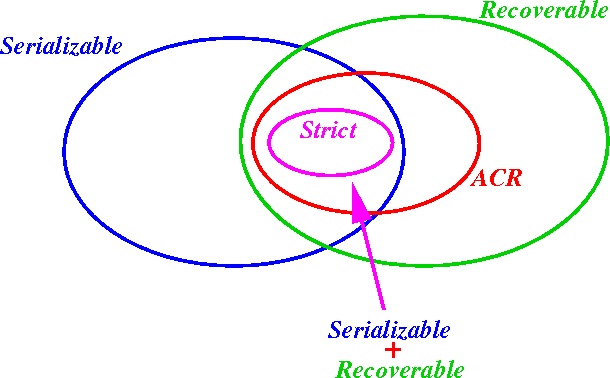- The strict locking rule:
- Transactions uses
2-phased locking
and
- A transaction
only release
its exclusive locks
and increment locks ---
any lock that allow the
transaction to
update a
DB element ---
after:
- The transaction has committed/aborted and
- The commit/abort log record has been written to disk
Graphically explained:

- Transactions uses
2-phased locking
and
- Strict 2-phased schedule:
- A strict 2-phased schedule
is:
- A schedule of concurrent executing transactions that follows (= obeys) the strict 2-phased locking rule
- A strict 2-phased schedule
is:
- Claim:
- A strict 2-phased schedule is always an ACR schedule
- Proof:
- By it definition,
in an ACR schedule:
- Transactions will always read (=use) data written by committed transactions
In other words, in an ACR schedule:
- Transactions do not read dirty data (written by uncommitted transactions)
- We will prove that:
- In a strict 2-phased schedule:
- Transactions can not read dirty data
(and the strict 2-phased schedule is therefore an ACR schedule)
- In a strict 2-phased schedule:
- Consider an
arbitrary transaction
T2 that
read some
DB element X that has been
written by
another
(arbitrary) transaction
T1:

We will insert locks and commits to make the schedule into a strick 2-phased schedule with regards to these 2 operations....
- The transaction T1
must have an exclusive lock on
DB element X in order to
write X:

- The transaction T1
must have released
the exclusive lock
on X
before transaction T2 could
read lock (= shared lock) the
DB element X:

-
By the strict 2-phased
locking rule,
the transaction T1
must have
committed
before the
unlock (exclusive lock)
operation:

- Therefore:
- Transaction T2 can
only read
DB elements
that have been
written by
committed transactions:

By the definition of an ACR schedule:
- A strict 2-phased schedule is always an ACR schedule
- Transaction T2 can
only read
DB elements
that have been
written by
committed transactions:
- By it definition,
in an ACR schedule:
- Claim:
- A strict 2-phased schedule is also a serializable schedule
- Proof:
- 2-phased locking can
enforce
conflict-serializability
- Conflict-serializable schedules are also serializable
- 2-phased locking can
enforce
conflict-serializability
- The following figure
shows the relationship of
the schedules that
were discussed:
